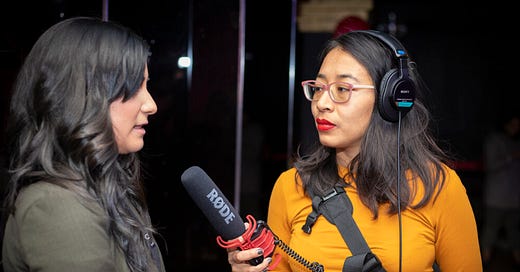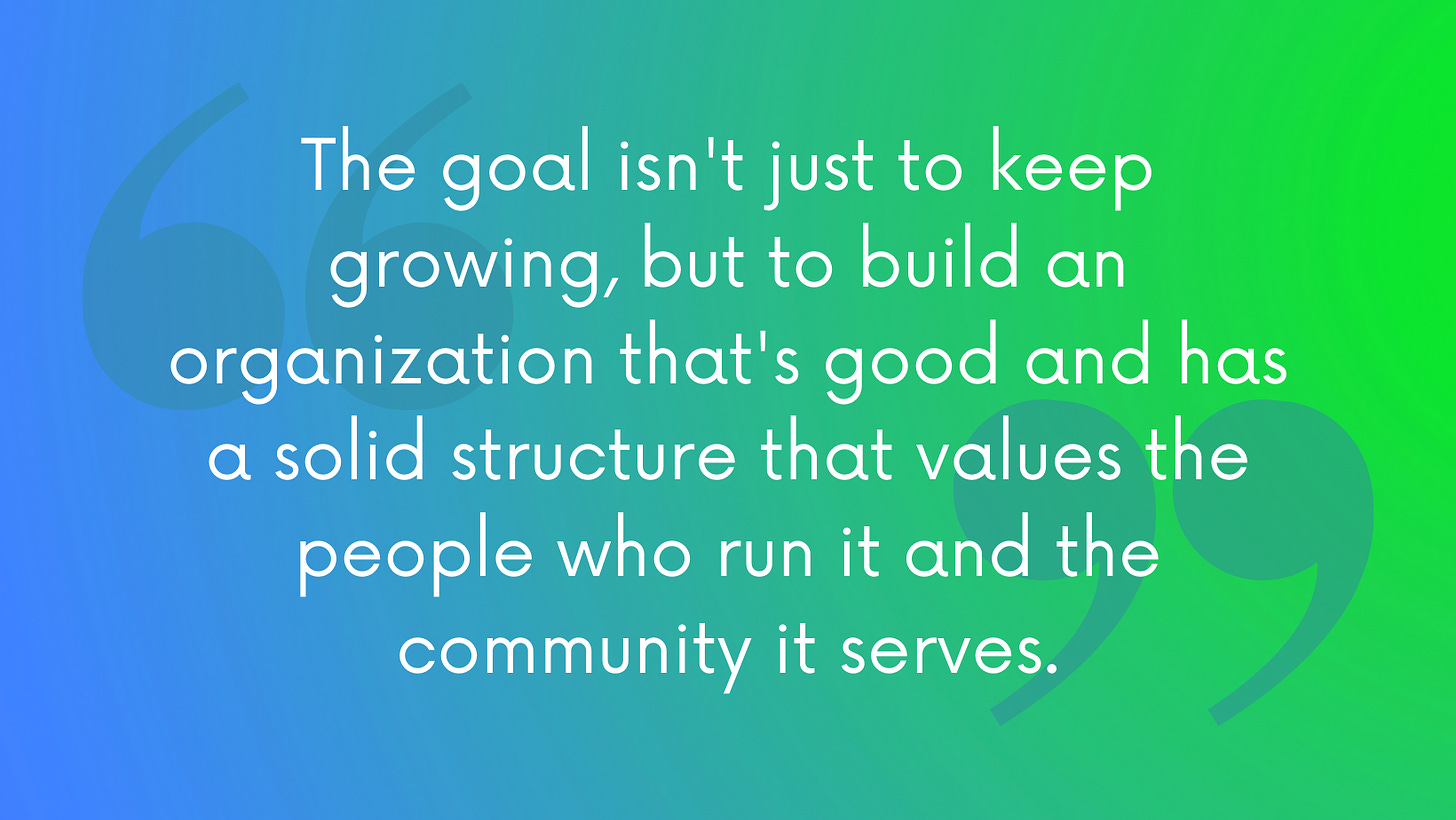Activism, journalism y la verdad
Irene Romulo and Cicero Independiente are serving neighborhood Latinx audiences. They're also pressing us to think bigger.
While the conversation about Latino/a/e/x service is interesting – Nieman Lab posted an interview yesterday with Irene Romulo that focused on that – Cicero Independiente’s most provocative element may be how it’s shifting our journalism perceptions.
Irene Romulo is a bilingual journalist and founding member of Cicero Independiente, an independent news organization for the people of Cicero, Illinois. As you’ll learn, she also came out of the activist space, not the journalism pipeline. The idea a previous activist can be a credible journalist surely horrifies some in the system. However, there is an argument for trust and engagement (on both sides of the issue) worth considering. For background, Lewis Raven Wallace and groups like PressOn have raised such before, as well as pushed back against ideas of journalistic objectivity.
“We believe in bringing people of diverse media backgrounds together to co-create news that is useful and necessary,” states Cicero Independiente’s mission. “We believe in journalism that is reflective of the knowledge, resilience and organizing in a working-class, Black, brown, and immigrant community, journalism that holds those in power accountable and, most importantly, that is accessible in multiple languages and formats.”
Cicero Independiente posits a powerful vision, and maybe it’s one journalism is more comfortable than ever with embracing. It’s not entirely mainstream, though. Also, we in public media have seen this debate raised for African Americans. Indicative of Hispanics’ complicated relationships, discussion of power and who our work serves seldom surfaces prominently in Latino/a/e/x media.
In our interview, Irene Romulo shares her background, how it informs her journalism, and how Cicero Independiente came together. We also touch on community service and examples of how the publication brings it to life. 👇👇👇
What brought you into journalism?
What first got me into journalism was seeing how undocumented people and communities of color are portrayed in the media. I noticed how our trauma is often centered and the resilience, organizing, and the fight that people are putting up are rarely covered. I was an organizer with a housing and immigrant rights organization in the Bay Area, and I continued that work in Chicago, primarily doing deportation defense work with undocumented community members. I was just often very disappointed and found myself angry at journalists who reached out to us looking, for example, for a sad mother who just got separated from her family member; or would focus on people in vulnerable moments of their lives without actually being given or asking for permission to display their images or share their stories of very traumatic events.
I grew up in Cicero, Illinois, which is a suburb on the south side of Chicago. More than 80 percent of the people who live here are Latinx or Spanish speakers or immigrants. Growing up here I recognize there are a lot of things happening in my own community that I knew nothing about because there was no news about it and no one covering it. There is a lack of information.
Not having that independent news outlet in the area makes government even less transparent. Local meetings, for example, are held in English in the middle of the day when people can’t attend them. And if you don't speak English well, tough luck. You don't know what it is that these elected officials just voted on.
It was a little bit of all of that. So, I asked, ‘well, why can't we be the ones who tell our own stories or be part of the media landscape?’ ‘Can I be a journalist? Can I be a reporter?’
There's an organization in Chicago called City Bureau, which has a reporting fellowship program for people like me who don't necessarily come from a journalism background, but who are interested in reporting, telling stories, and doing investigative work. I applied for that program and did the fellowship. I see it as a continuation of organizing work because journalism has a lot of power and it's still a form of advocacy. Journalists decide what issues get covered, who gets a platform and what stories are important.
I was lucky enough to meet other people who grew up in Cicero as well, who were also thinking the same as me. They wanted to see an independent, bilingual news outlet run for the people who live here. We got together and dreamed up of Cicero Independiente together and launched it in 2019.
What are you most proud of so far?
I’m proud that we are taking the time to invest in people like me or people in our community who, again, may not necessarily come from a journalism background, but who are interested and are sharing information. Just because they're not journalists, it doesn't mean they're not doing their investigations. They just need more paid opportunities to be able to do so, and to learn some skills that could be helpful. We have a fellowship program that we've run since the beginning. Even though we only have enough money to fund three spots, we recently got over 70 applicants. They were all local, young people of color interested in photojournalism, writing or audio. It just shows how much desire there is to be a part of doing media – to be the journalists who are telling the stories.
We need to spend more time investing in programs that support that growth and that development for people and making sure that they're paid well. Like, just because they're newcomers or they may be interns or younger people, doesn’t mean they shouldn’t be compensated equitably for all the ideas and everything that they bring. I wish more newsrooms took the time to do that. It may take younger people or maybe perhaps less experienced people a bit longer to produce something. But that doesn't mean that it's not going to be quality or done well. These are also the people that will hopefully help run your organization once it’s time for you to go, so why not invest in their growth.
In public media, we talk about wanting to bring in diverse talent, but is it just going to replicate the same systems of power if it's from the same schools, same pipeline. How do you develop this space?
There has to be a different way to make sure that we're bringing those people in and giving them the support that they need and the power to make decisions. I don't think it should end at just making sure we have 10 Black or brown people in the room. If none of those 10 people are given the power to make the decisions and to make change or if they just have to follow the same script, It's just putting a different color on the same problems.
With Spanish-speaking communities, it's not just about translating. You have to find out and make sure that your reporting is actually what people want to see, and do the work to make sure that that reporting gets out there. It's not enough to publish a story if people don't know that the website exists, even if the text is in Spanish. It's not going to magically reach the people that it should be reaching. There's a lot of work that needs to be done to make sure that the reporting is informed, and that people know the reporting is there.
What can public media learn from what you're doing as a non-profit media organization?
As a nonprofit emerging news organization, we still have a long way to go, right? We still have our own challenges, like funding, which other places are still facing. But we're willing to try things that are different. And what's important for us is being able to do reporting that doesn't see our Latinx community as just another market, but takes the time to produce what's reflective of the people who live here.
Even in a community like Cicero, where over 80 percent of the population is Latinx, we are not a monolith. Our immigration status, our generation, our access to language, whether we're bilingual or not – it all affects the kind of reporting that people here need and want to see. We see trends in what younger people are interested in and what older audiences are interested in. So, we're taking the time to understand those needs. We want to make sure that we are establishing a base for a long-term presence, or at least until we're no longer needed as an organization.
There are a lot of individuals who would like to start up their own organization. What advice would you have for them?
When we started, we followed other roadmaps that are out there. The Listening Post Collective, for example, was one resource we used, and organizations like City Bureau gave advice. I think it’s important to talk to other people on how to get started as you figure out what will work for you and your community. At the time, we didn't know about developing a business plan, but we’ve learned that developing organizational structures should be a priority, not just producing content. One thing I think we did well was taking the time to interview people before launching. Those interviews informed how we started producing our stories and the editorial choices that we made in the beginning.
We also set realistic expectations. Like, we knew that, if we can only produce one story a week based on our capacity, then that's what we can produce. We're the ones that are setting the benchmarks and deciding what success means for us.
I wish we would have planned out a little bit more for the whole funding situation. We all had other jobs when we started. We were trying to figure out how to make it work outside of our regular day jobs, which was a big difficulty. When 2020 happened, a lot of funding became available for rapid response work. And that's kind of where we started funding our work. We knew, however, that we couldn’t count on that funding later, because it was a lot of one-time emergency response grants. But they helped us respond to an immediate crisis while freeing up capacity for more fundraising.
We're slowly building, but we also know that it's not about random growth. The goal isn't just to keep growing, but to build an organization that's good and has a solid structure that values the people who run it and the community it serves.
Founding an organization is a tough business.
When we started off, we didn't know exactly where we would go. We were all volunteers in the beginning and very grassroots. And we're learning along the way, incorporating our experiences in organizing or other nonprofit spaces, and learning journalism skills along the way.
It's been a lot of work to fundraise – to launch a whole organization and make sure that we are paying ourselves and not burning out. It’s difficult work, but I don't want that to sound discouraging. It's good work that, from what we're seeing, is valuable and is making a difference for the people who live in Cicero. We’re writing ourselves and our town into history. That’s what matters to me.
What has been the secret of good collaboration with other organizations?
Most of the newsrooms that we've partnered with are smaller newsrooms that are trying to do things differently and are led by people of color and do reporting for people of color. That has been helpful because our values align. In other cases, we're very clear about when we approach other newsrooms to discuss the support that we need. Just being clear about what we bring in and what our needs are has made our collaborations fruitful. We're constantly trying to think about ways that we can do reporting that's equitable and that advances the people who it's for. So, that has certainly helped to make sure that we have effective collaborations. 🟢
La próxima ⌛
The next OIGO is in your inbox April 1. The next newsletter will focus on something I’ve done a few talks on, but is worth documenting. Last year, San Francisco’s KQED did a qualitative and quantitative study into area Latino/a/e/x audiences, their needs, consumption habits and interests. I know it’s popular to say our regional differences make our local findings unique. However, what was revealed will certainly have resonance with your local endeavors. I’ll tell you about it next OIGO.
-- Ernesto
Cafecito: stories to discuss ☕
“Mexico is a country that lives in a war between drug cartels, where part of the institutions and public officials are in collusion with one side or another,” Mexican journalist Anabel Hernández says in an wide-ranging interview. “If we journalists cannot even trust the authorities, who can protect us? Many of us have learned through bitter experience to protect ourselves.”
RIP to Emilio Delgado, also known as Luis on Sesame Street, who passed at 81. How important his presence was to a generation that had not seen themselves represented on television is the subject of conversation.
Manhattan's bilingual street signs are vanishing. In the 1960s, New York City installed street signs in English and Chinese. Through a puzzling series of events, the signs are being replaced by English-only ones. The community is demanding to know why.
Americano, a Spanish-language conservative channel, debuted on SiriusXM. Lots of chatter about Democrats and Hispanics ensues. This could be a story to watch come November.
El radar: try this 📡
Ask more about Hispanic evangelicals and politics locally. The Los Angeles Times has a fascinating story on the rise of political engagement among Latino/a/e/x religious conservatives. They’re a group who once stayed out of politics. Today, more leaders are seeing involvement as a civic duty.
Highlight your Latino/a/e/x education pioneers. KCET did just that in telling the story of María Guadalupe Evangelina de López. She was one of a group of women demanding leadership in the California Teachers Association, which prohibited women to hold office.
Talk about Latino/a/e/x leadership transitions. The departure of Jennie Emire Rodriguez after 25 years at the Mission Cultural Center for Latino Arts in San Francisco seems part of an ongoing trend of longtime nonprofit leadership retiring from their roles. We're seeing this a lot in public media. El Tecolote spoke with her about the journey. I wonder how many other Hispanic leaders are passing the torch this year.
Read up on Hispanics and comics. This story has been told many times over the years. Oregon Public Broadcasting sought to provide a local spin, focused on a Portland publisher.
To brighten your morning, here’s Luis and Maria’s Sesame Street wedding, which was broadcast in 1988. Thank you for reading.










Gracias, Ernesto. I learn a lot from reading Oigo. Holly
Hi Ernesto- Your post really resonates with me. ¿Qué Pasa, Midwest? collaborated with Cicero Independiente for an episode in Season Seven of the podcast. The process of creating an audio podcast episode of their work was definitely a learning experience, but also a rewarding one. We learned much from April Alonso and the CI journalism model that we will use in expanding our regional bilingual reporting network in 2022. Here's a link to the episode: https://tinyurl.com/4tr9uprd